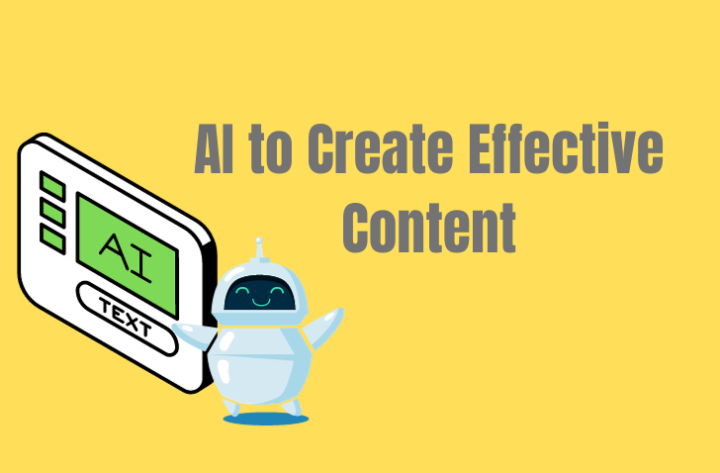Companies are constantly searching for innovative ways to engage their audience and drive growth. One of the most powerful tools in their arsenal is artificial intelligence (AI). While it might not be immediately obvious how AI ties into content creation, businesses are harnessing this technology in creative ways to craft compelling and effective content that resonates with their target audience. In this blog, we’ll explore how AI is transforming content creation, and helping businesses thrive in the digital age.
Why is AI Important for Businesses?
Artificial Intelligence (AI) is a cutting-edge technology that enables machines to mimic human intelligence and cognitive functions. It encompasses various processes such as learning, reasoning, problem-solving, perception, and language understanding. AI systems are created to analyze extensive amounts of data, recognize patterns, and make scholarly decisions without explicit programming.
The importance of AI for businesses cannot be overstated in today’s digital age. Here are several key reasons why AI is a game-changer for businesses:
- Enhanced Decision-making: AI provides data-driven insights and predictive analytics, aiding businesses in making informed and strategic decisions. By analyzing patterns and trends, AI systems can foresee potential outcomes, helping companies devise effective strategies.
- Automation and Efficiency: AI-powered automation streamlines repetitive tasks, allowing businesses to allocate human resources more efficiently. This not only saves time but also minimizes errors, leading to improved productivity and cost-effectiveness.
- Personalization and Customer Experience: AI helps in understanding customer preferences and behavior through data analysis. This information allows businesses to personalize their products, services, and marketing efforts, enhancing overall customer satisfaction and engagement.
- Customer Support and Interaction: AI-driven chatbots and virtual assistants enable 24/7 customer support, answering queries and providing assistance promptly. This not only enhances customer experience but also reduces the workload on human support teams.
- Innovation and Product Development: AI fosters innovation by generating insights from diverse data sources. It helps in designing and developing new products or improving existing ones based on market demands and consumer feedback.
- Risk Management and Fraud Detection: AI algorithms can detect anomalies and potential risks in real time. This is particularly valuable for financial institutions in fraud detection and risk assessment, ultimately safeguarding businesses and their customers.
- Operational Optimization: AI optimizes operational processes by analyzing data to improve supply chain management, resource allocation, and inventory management. This leads to cost savings and increased operational efficiency.
- Competitive Edge: Implementing AI technologies offers a competitive advantage by staying ahead in technological advancements. Businesses that embrace AI early tend to outperform competitors by leveraging the benefits AI offers.
14 Ways Businesses are Using AI to Create Effective Content
Artificial Intelligence (AI) has revolutionized content creation for businesses across various industries. It offers innovative solutions to streamline processes, improve efficiency, and enhance the quality of content.
Here, we’ll explore 14 ways businesses are leveraging AI to create effective content:
-
Automated Content Generation:
Automated content generation involves using AI algorithms to produce written material without human intervention. AI analyzes data and patterns to generate content, ranging from articles and reports to product descriptions. This process significantly speeds up content creation, enabling businesses to produce a high volume of material in a shorter time while maintaining quality and relevance.
-
Chatbots and Virtual Assistants:
Chatbots and virtual assistants use AI to simulate human-like conversations with users. They engage customers, answer queries, provide assistance, and even perform tasks based on pre-set commands or learned behavior. These AI-driven applications enhance customer service, automate responses, and provide a seamless user experience, especially in the realm of online customer support and assistance.
-
Content Curation:
AI-powered content curation involves using algorithms to discover, gather, and organize relevant content from various sources. This curated content is then presented to target audiences, saving time and effort in manually searching for information. Businesses can share curated content on their platforms to keep their audience informed about industry trends, news, and valuable insights.
-
Email Marketing:
AI enhances email marketing by personalizing email content based on recipients’ preferences, behaviors, and interactions. It optimizes email send times, subject lines, and message content to increase open rates and engagement. AI algorithms analyze past email performance to continually refine and improve future email campaigns.
-
Video and Image Generation:
AI can generate videos and images through deep learning algorithms. This is especially useful for creating visual content for marketing purposes, product demos, advertisements, and social media. AI-generated visuals can be tailored to specific styles, preferences, or themes, saving time and resources for businesses.
-
Content Optimization:
AI tools analyze content for search engine optimization (SEO) to improve its visibility in search engine results. They recommend relevant keywords, suggest optimizations, and ensure that the content aligns with current SEO best practices, ultimately driving more organic traffic to the content.
-
Language Translation:
AI-powered language translation tools use machine learning to accurately translate content from one language to another. This enables businesses to reach a broader international audience and expand their market reach without the need for manual translation efforts.
-
Social Media Automation:
Social media automation with AI involves scheduling and automating social media posts. AI algorithms analyze engagement data and user behaviors to determine optimal posting times and content types, leading to improved audience reach and interaction.
-
Content Personalization:
Content personalization uses AI to tailor content according to the preferences, behavior, and history of individual users. By delivering content that resonates with users on a personal level, businesses can enhance user engagement, satisfaction, and conversion rates.
-
Content Frameworks:
AI-powered content frameworks provide templates and guidelines for content creation, ensuring consistency in style, structure, and branding. These frameworks save time by offering a structured starting point for various types of content.
-
Content Editing and Proofreading:
AI-based editing and proofreading tools analyze written content for grammatical errors, punctuation, style, and readability. They suggest corrections and improvements, helping businesses maintain high-quality and error-free content.
-
Content Summarization:
AI-powered content summarization condenses lengthy content into shorter, more digestible summaries. This is valuable for busy readers who want to grasp the main points of an article or report quickly.
-
Content A/B Testing:
AI facilitates content A/B testing by creating variations of content and analyzing their performance to determine which version is more effective. This data-driven approach helps businesses optimize content strategies and tailor them for better audience engagement.
-
Content Analytics:
AI-powered content analytics track the performance of content across various metrics such as engagement, conversions, click-through rates, and more. These insights enable businesses to understand their audience better and make data-driven decisions to refine and improve content strategies for optimal results.

